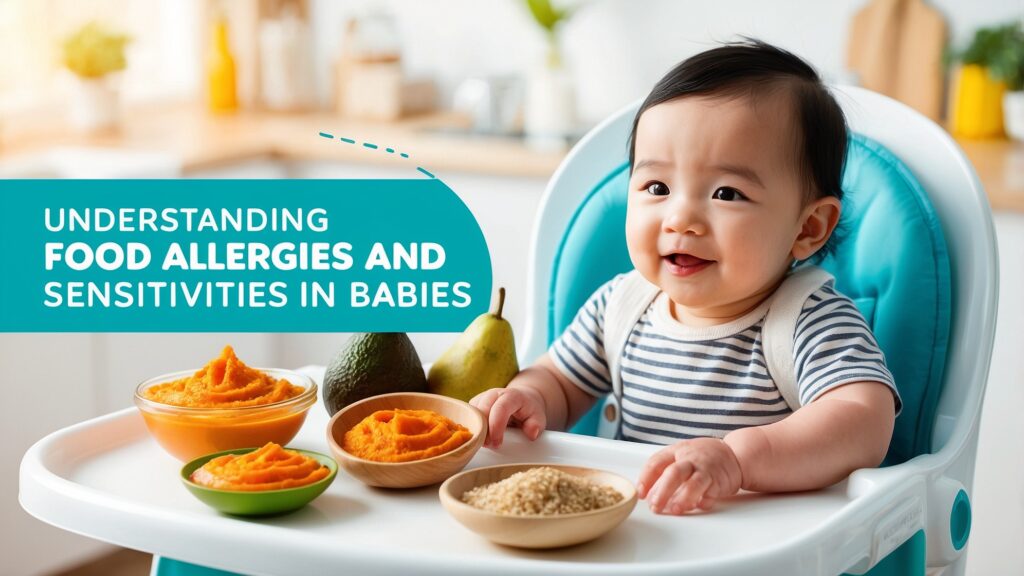Food allergies and sensitivities can be a significant concern for new parents. Identifying and managing these issues early on is crucial for your baby’s health and well-being. In this guide, we’ll explore common food allergies and sensitivities in babies, how to identify them, and provide practical tips and recipes to help you navigate this important aspect of baby care.
What Are Food Allergies and Sensitivities?
Food Allergies occur when the immune system mistakenly identifies a harmless food protein as a threat. This can lead to a range of symptoms, from mild to severe, such as hives, swelling, or difficulty breathing.
Food Sensitivities, on the other hand, are less severe and do not involve the immune system. They can cause digestive issues, such as gas, bloating, or diarrhea. Sensitivities are often less predictable and can be challenging to diagnose.
Common Food Allergies in Babies
- Cow’s Milk: One of the most common allergens, cow’s milk allergy can cause symptoms ranging from skin rashes to gastrointestinal issues. Consider alternative sources of calcium and protein, such as fortified plant-based milk.
- Eggs: Eggs are a frequent allergen and can cause reactions from mild rashes to more severe symptoms. Opt for egg substitutes in recipes, like mashed bananas or applesauce.
- Peanuts: Peanut allergy is becoming more common and can lead to severe reactions. If there’s a family history of peanut allergy, consult with your pediatrician before introducing peanuts.
- Tree Nuts: Almonds, walnuts, and other tree nuts can also be allergens. Introducing these in a controlled manner and monitoring for reactions is essential.
- Soy: Soy allergies are relatively common and can cause symptoms similar to those of cow’s milk allergy. Look for soy-free alternatives when preparing meals.
How to Identify Food Allergies and Sensitivities
- Monitor Symptoms: Keep a food diary to track what your baby eats and any symptoms that occur. This can help you identify potential allergens.
- Introduce New Foods Gradually: When introducing new foods, do so one at a time and wait a few days before introducing another. This approach helps isolate any potential allergens.
- Consult a Pediatrician: If you suspect your baby has a food allergy or sensitivity, seek professional advice. A pediatrician can provide guidance and may recommend allergy testing.
Managing Food Allergies and Sensitivities
- Read Labels Carefully: Always check ingredient labels for potential allergens. Many packaged foods contain hidden sources of common allergens.
- Prepare Homemade Meals: Cooking at home allows you to control the ingredients and avoid cross-contamination. Use fresh, whole ingredients to minimize the risk of allergic reactions.
- Substitute Allergens: Use allergen-free substitutes in your recipes. For example, use almond milk instead of cow’s milk, or flaxseed meal as an egg substitute in baking.
- Educate Caregivers: Ensure that anyone who cares for your baby is aware of their allergies and knows how to manage them. Provide clear instructions and emergency contact information.
Allergy-Friendly Recipes for Babies
1. Sweet Potato and Apple Puree: A nutritious and allergy-friendly option, this puree combines sweet potatoes and apples for a smooth, sweet taste that’s gentle on the stomach.
2. Quinoa and Vegetable Mash: A great alternative to rice, quinoa is a complete protein and easy to digest. Combine with finely chopped vegetables for a wholesome meal.
3. Banana Oatmeal Porridge: Made with oats and mashed bananas, this porridge is perfect for babies with milk allergies. It’s soft, soothing, and packed with nutrients.
4. Avocado and Pear Blend: This simple puree combines ripe avocados and pears for a creamy, nutrient-rich meal that’s free from common allergens.
Conclusion
Managing food allergies and sensitivities in babies requires vigilance and a proactive approach. By understanding common allergens, monitoring your baby’s reactions, and using allergen-free recipes, you can help ensure your baby’s diet is safe and enjoyable. Always consult with your pediatrician for personalized advice and guidance.

